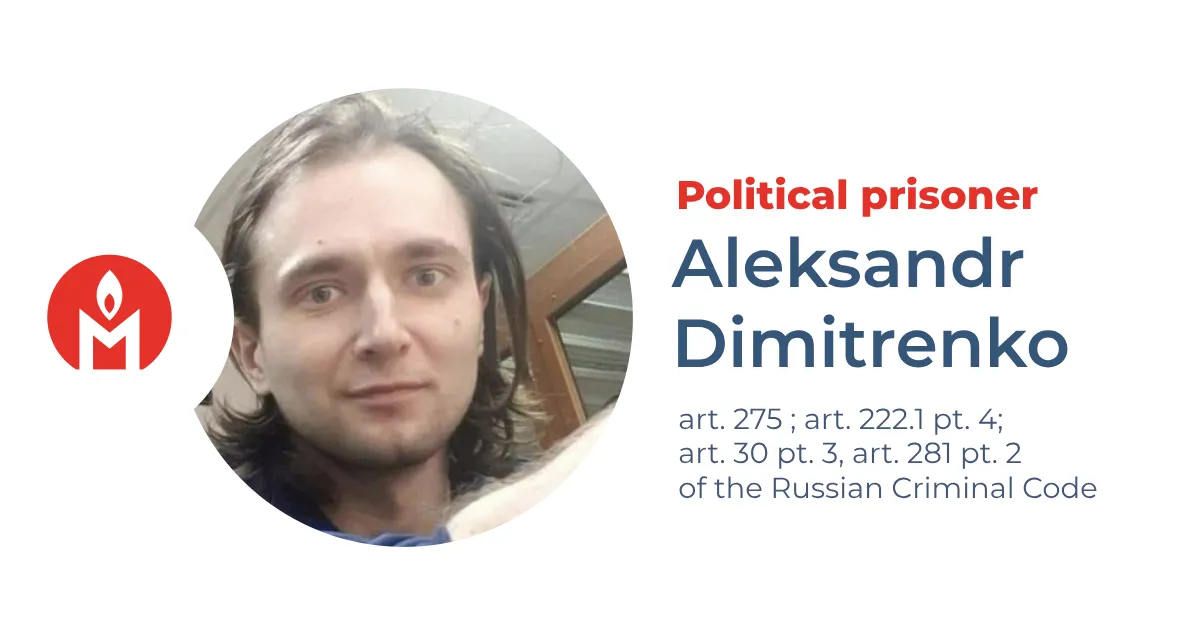Aleksandr Dimitrenko is a political prisoner
A worker at the Novovoronezh nuclear power plant has been sentenced to 22.5 years’ imprisonment on fabricated charges of sabotage and treason
The ‘Political Prisoners. Memorial’ human rights project, in accordance with international standards, considers Aleksandr Dimitrenko a political prisoner. Dimitrenko has been convicted of treason, possession of explosives, and attempted sabotage because he allegedly prepared an explosion on a railway line at the behest of the Ukrainian services and passed them classified information about Rosatom employees. Dimitrenko’s criminal prosecution and conviction violate his right to freedom of expression and fair trial. We demand Dimitrenko’s immediate release and that all criminal charges against him be dropped.

Who is Aleksandr Dimitrenko and what were the charges against him?
Aleksandr Dimitrenko, from Voronezh Oblast, has been interested in local history, studied the historical and cultural ties between his region and Ukraine, and has spoken Ukrainian since childhood. His Ukrainian friends include Euromaidan activists and participants in the war in Donbas. Aleksandr Dimitrenko corresponded with them on Telegram, discussing history and current politics.
On 28 May 2022, Dimitrenko’s home was searched, as a result of which explosives and a ‘secret’ phone, on which he allegedly received instructions from Ukraine to commit sabotage, were found. Dimitrenko was remanded in custody. Later, he was also charged with giving Ukrainian security services a list of Rosatom employees sent to work at the Russian-occupied Zaporizhzhia nuclear power plant.
On 22 March 2024 Dimitrenko was found guilty of treason (Article 275 of the Criminal Code of the Russian Federation), attempted sabotage as part of an organised group (Article 30, Part 3, in conjunction with Article 281, Part 2) and illegal acquisition and storage of explosives as part of an organised group (Article 222.1, Part 4). He was sentenced to 23 years in a strict-regime penal colony. On appeal, his sentence was reduced by six months.
Why do we consider Dimitrenko a political prisoner?
Aleksandr Dimitrenko did send his Ukrainian acquaintance information about Russian employees of Rosatom sent to work at the Zaporizhzhia nuclear power plant. However, this information took the form of a link to an open-access Telegram channel run by the Ukrainian Energoatom organization which had published this list of staff. At the same time, the investigative authorities insisted that Dimitrenko was the original source of the information. The charge is therefore completely fabricated. It should be noted that the evidence cited was a Russian translation of the original message from the Ukrainian online source and not screenshots of Dimitrenko’s correspondence. Furthermore, there was no recognition of the fact that Dimitrenko had sent a link to this text, and not the text itself.
The main evidence with regard to the charge of ‘preparation of sabotage’ were the explosives and the ‘secret’ phone. Dimitrenko himself claims these items were planted on him and then placed in contact with his bedding in order to pick up biological traces. The circumstances of the search confirm this version. However, the court rejected repeated requests by the defence lawyer for a fingerprint examination to be conducted. The investigative authorities also cited other evidence that we consider incorrect, for example claiming without grounds that a person with whom Dimitrenko allegedly corresponded on the ‘secret’ phone was also one of his Ukrainian acquaintances with whom he was in touch on his regular phone. Also, the investigative authorities claimed they had identified the path Dimitrenko took to the explosives cache, citing data on his movements that had nothing to do with this place.
In relation to none of the charges did the court take into account evidence that indicated Dimitrenko’s innocence. The politically motivated nature of the charges was shown by both their context – Russia’s war of conquest against Ukraine – and by the efforts of the investigative authorities to vilify Dimitrenko. Large parts of the indictments and the verdict were taken up with descriptions of his interests, acquaintances and ‘pro-Ukrainian’ position. In our opinion, Dimitrenko’s pro-Ukrainian views, openly expressed on social media, were the reason for his prosecution and, most likely, the fabrication of the charges.
A detailed description of Aleksandr Dimitrenko’s case and of our position is available on our website.
Recognition of an individual as a political prisoner does not imply the ‘Political Prisoners. Memorial’ human rights project agrees with, or approves, their views, statements, or actions.
How can you help?
You can write to Aleksandr Dimitrenko at the following address:
In Russian: 412315, Саратовская область, г. Балашов, ул. Уральская, д. 17, ФКУ Т УФСИН России по Саратовской области
In English: Aleksandr Aleksandrovich Dimitrenko (born 1992), Prison, Federal Penitentiary Service of Russia for Saratov Oblast, 17 Uralskaya Street, Balashov, Saratov Oblast, 412315, Russia.
You can also send an email via ZT services (for payment with Russian bank cards), OVD-Info and Memorial-France (free of charge).
Please note that letters in languages other than Russian are highly unlikely to reach the recipient.
You can donate to help all political prisoners in Russia.

